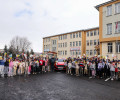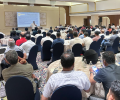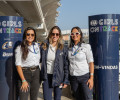ADAC expands technical consumer protection
The Allgemeiner Deutscher Automobile-Club e.V. (ADAC) is expanding its expertise in the field of technical consumer protection tests and plans to upgrade its facilities at Landsberg am Lech and Penzing to an innovation campus.

For decades, ADAC has carried out and further developed its high-level technical consumer protection tests at its technical centre in Landsberg. This is where ADAC concentrates its practical and independent activities on issues such as road safety, environmental and climate protection as well as new vehicle and infrastructure developments. In addition, it has used the premises of the former air base Penzing since 2016 for the testing of driver assistance systems and automated driving functions along with car-to-x communication.
In close cooperation with the neighbouring model town for intelligent mobility at Landsberg am Lech, the innovation campus in Penzing will be a real-life testing facility where new modes of mobility will materialise with the creation of urban and sustainable habitats. ADAC will discharge its responsibility by getting actively involved in the implementation of intelligent and green mobility.
On the basis of the ADAC concept for the innovation campus, Landsberg am Lech and Penzing will also apply to act as satellites for the German Centre of Future Mobility (Deutsches Zentrum Mobilität der Zukunft, DZM) of the Federal Ministry of Transport and Digital Infrastructure.
Based on new technological opportunities, the DZM is to find answers to the question of how people can move around and goods be transported. The focus will be on planning and developing future mobility concepts that are constructive, interdisciplinary and innovative and to directly put them to a practical test. The project addresses both industry and science to establish a close cooperation with universities and non-university research institutions.
ADAC believes that its two locations are ideal for proactive participation in DZM future mobility tasks. Already at this point, the close collaboration with the persons in charge in the municipalities and the intensive exchange among industry, science and society emerge to be success factors.

 Facebook
Facebook Twitter
Twitter






